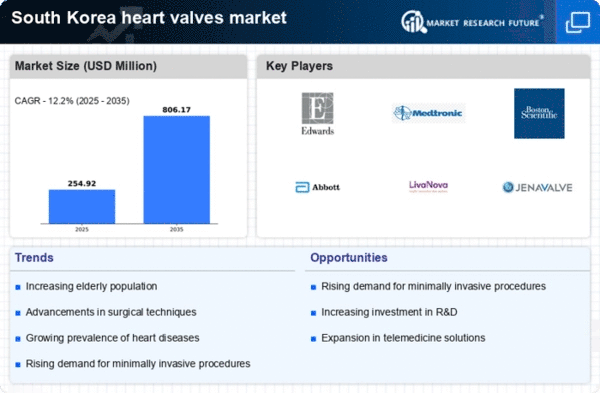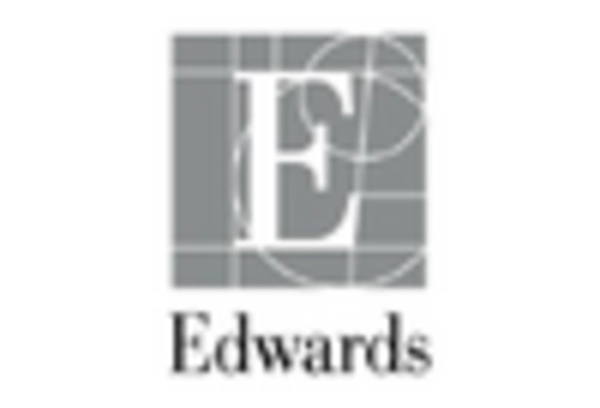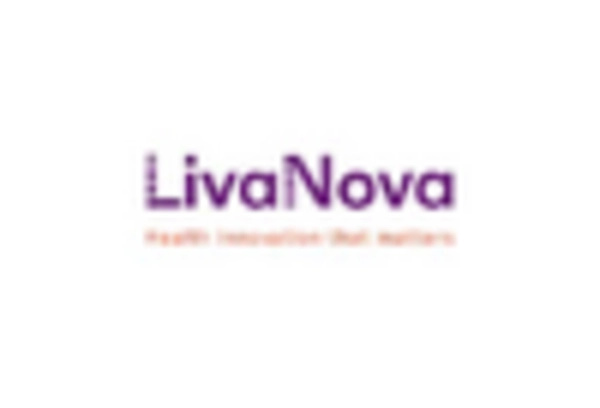Rising Aging Population
The heart valves market in South Korea is experiencing growth due to the increasing aging population. As individuals age, the incidence of heart-related ailments tends to rise, leading to a higher demand for heart valve replacements and repairs. According to recent statistics, approximately 15% of the South Korean population is aged 65 and older, a figure projected to increase significantly in the coming years. This demographic shift is likely to drive the heart valves market, as older adults are more susceptible to conditions requiring surgical interventions. Furthermore, advancements in surgical techniques and valve technologies may enhance patient outcomes, thereby encouraging more individuals to seek treatment. The heart valves market must adapt to this demographic trend by ensuring the availability of innovative and effective solutions tailored to the needs of the elderly population.
Increased Healthcare Expenditure
Healthcare expenditure in South Korea has been on the rise, which positively impacts the heart valves market. The government has been investing heavily in healthcare infrastructure and services, with a focus on improving cardiovascular care. In 2025, healthcare spending is expected to reach approximately 9% of the country's GDP, reflecting a commitment to enhancing medical services. This increase in funding allows for better access to advanced heart valve treatments and technologies, which may lead to improved patient outcomes. Additionally, as more healthcare facilities adopt cutting-edge technologies, the heart valves market is likely to benefit from increased demand for innovative products. The correlation between healthcare expenditure and market growth suggests that continued investment in healthcare will be crucial for the heart valves market's expansion in South Korea.
Growing Awareness of Heart Health
There is a notable increase in public awareness regarding heart health in South Korea, which is influencing the heart valves market. Educational campaigns and health initiatives have been implemented to inform the population about the risks associated with cardiovascular diseases. As awareness grows, individuals are more likely to seek medical advice and undergo regular check-ups, leading to earlier detection of heart conditions. This proactive approach can result in a higher demand for heart valve interventions, as patients become more informed about their treatment options. The heart valves market must capitalize on this trend by providing educational resources and promoting the benefits of timely interventions. The potential for increased patient engagement and demand for heart valve solutions is significant, suggesting a positive outlook for the market.
Technological Innovations in Medical Devices
Technological innovations are playing a pivotal role in shaping the heart valves market in South Korea. The development of minimally invasive surgical techniques and advanced materials for heart valves has revolutionized treatment options. For instance, transcatheter aortic valve replacement (TAVR) has gained popularity due to its reduced recovery time and lower risk of complications. The heart valves market is likely to see continued growth as these innovations become more widely adopted. Furthermore, research and development efforts are focused on creating biocompatible materials that enhance the longevity and performance of heart valves. As healthcare providers increasingly embrace these advancements, the demand for innovative heart valve solutions is expected to rise, indicating a dynamic future for the market.
Rising Incidence of Lifestyle-Related Diseases
The heart valves market in South Korea is also being driven by the rising incidence of lifestyle-related diseases. Factors such as poor diet, lack of physical activity, and increased stress levels contribute to cardiovascular issues, leading to a higher demand for heart valve treatments. Recent studies indicate that nearly 30% of the South Korean population is affected by hypertension, a condition that can lead to heart valve disorders. This trend underscores the need for effective interventions and treatments within the heart valves market. As healthcare professionals address these lifestyle-related health challenges, the market is likely to expand, driven by the need for innovative solutions that cater to the growing patient population. The interplay between lifestyle factors and heart health is crucial for understanding the future trajectory of the market.
















